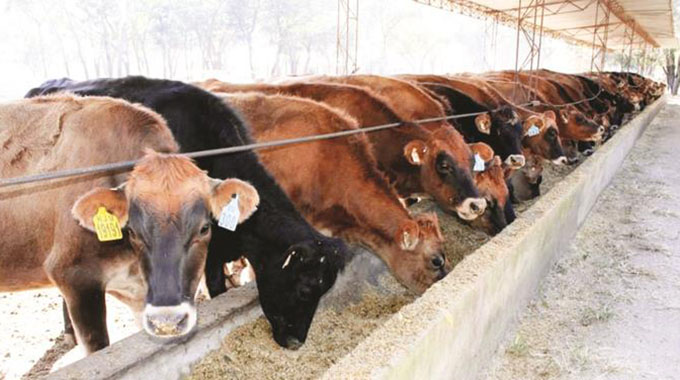
Talent Bope recently in MHONDORO
The European Union has donated 500 in-calf heifers and €7 million to small-scale and medium-scale dairy farmers to boost milk production in the country.
The in-calf heifers programme will run in all rural provinces, and has so far seen 121 farmers, among them 59 women, benefiting.
The 7 million euros, of which 90 percent was funded by the EU and the balance came from We Effect Zimbabwe, will strengthen links between production, processing and financing.
This comes after the number and contribution of smaller dairy farmers has significantly increased and is part of a growing effort to rapidly expand the dairy herd so that Zimbabwe can be self-supporting in dairy.
The programme, which is part of Transforming Zimbabwe’s Dairy Value Chain for the Future, a national dairy project under the Zimbabwe Agricultural Growth Programme, is expected to augment milk production to meet the targeted 130 million litres up from 76 million produced last year.
The transforming project is a four-year initiative funded by the EU, being championed by We Effect in partnership with the Zimbabwe Association of Dairy Farmers, Zimbabwe Farmers Union and Zimbabwe Dairy Industry Trust.
In a speech read on his behalf by Deputy Minister Vangelis Heritatos, during the handover ceremony of in-calf heifers in Mhondoro yesterday, Minister of Lands, Agriculture, Fisheries, Water and Rural Settlement Dr Anxious Masuka said the development was a result of the Government coming up with various dairy revitalisation programmes, including the Zimbabwe Agricultural Growth Programme.
“The action is contributing to the realisation of the Zimbabwe Agricultural Growth Programme expected outcomes, especially increased production and productivity of the livestock sector and increased public and private investment in targeted livestock value chains,” said Dr Masuka.
Under the 11th European Development Fund, the EU and the Zimbabwe Government through ZAGP, with the budget of 40 million euros, have the overall objective to contribute to the development of a diversified and efficient agriculture sector that promotes green economic growth.”
Dr Masuka lauded the EU for coming up with a master plan to address a myriad of challenges that was facing the dairy sector through funding.
“I would like to commend the European Union and the Dairy Consortium partners for sponsoring and facilitating the importation of 500 in calf dairy in this project for the empowerment of the small scale dairy farmers in Zimbabwe, he said.
“These 500 in-calf heifers from the project are being matched on a one to one basis. I believe this dairy development project was organised at the right time when Government is promoting the revitalisation of the dairy sector through various growth initiatives as a strategy to improve milk quantity and quality.”
Dr Masuka said the Government was recognizing and appreciating the initiatives and efforts by stakeholders in the local dairy sector that have seen a steady growth in milk production from 36 million tonnes in 2009 to 76 million litres in 2020 and is targeted for further growth.
Dr Masuka said the initiative was in sync with the national agenda “Government’s national development agenda is implementing national strategies that are aimed at transforming the livestock sector which include among them, Livestock Growth Plan, Agriculture and Food Systems Transformation Strategy and National Development Strategy,” said Dr Masuka.
TranZDVC project coordinator Dr Edson Chifamba said the thrust of the project was to improve productivity through smart dairy farming which is environmentally friendly.
“The project seeks to improve dairy value chain economic performance through inclusive business models, DVC social performance through a matching grant facility and the use of climate smart dairy farming as well as the use of renewable energy,” said Mr Chifamba.
Stakeholders in dairy production attended the function.
